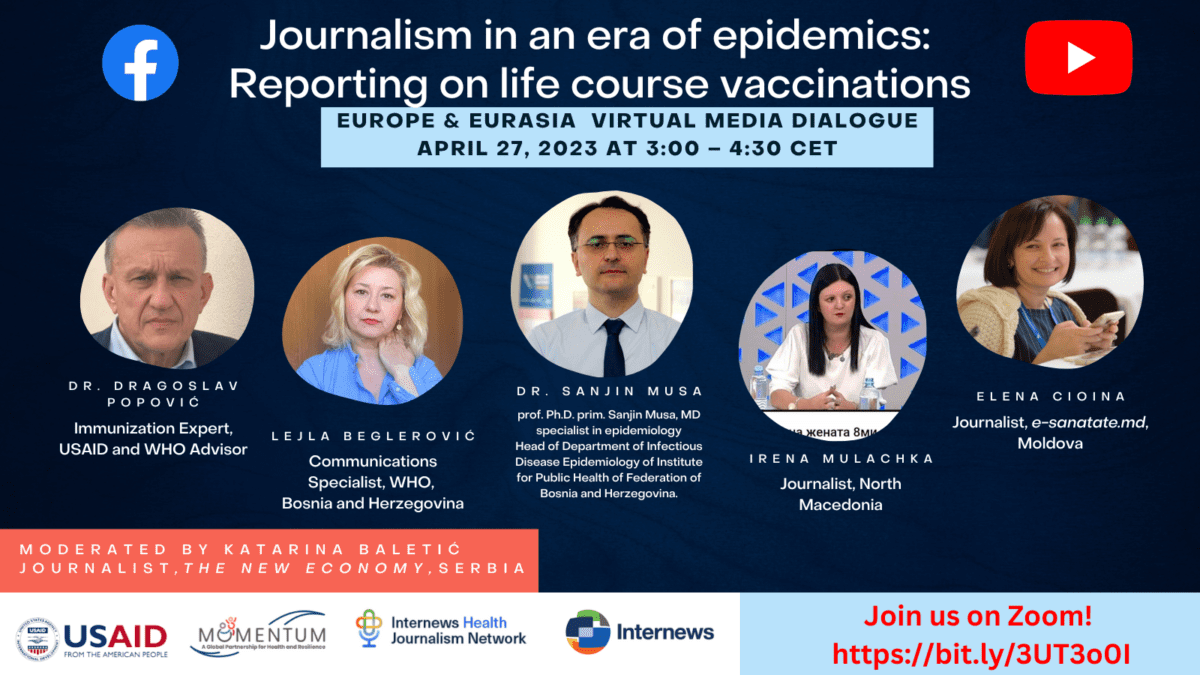By Aleksandra Ničić, Journalist’s Association of Serbia

Credible information about vaccination is essential to increasing people’s confidence in immunization and in the overall healthcare system. This was the main message conveyed by doctors, journalists, and communication experts who took part in a virtual media dialogue, “Journalism in an Era of Epidemics: Reporting on Life Course Vaccinations” held on April 27 across the Balkan region. The discussion was organized by the Internews Health Journalism Network and supported by the USAID MOMENTUM Routine Immunization Transformation and Equity project, covering Serbia, North Macedonia, Moldova, and Bosnia and Herzegovina.
At the start of the discussion, Dr. Popović, immunization expert and World Health Organization (WHO) adviser, noted that the media plays a crucial role in facilitating communication between healthcare workers and the public.
Without information, there can be no awareness about vaccination, let alone across the lifespan. Information needs to be two-way and rooted in understanding and respect. The media not only conveys messages from medical personnel to the public, but it also uplifts the voices of marginalized groups to reach doctors.
Dr. Dragoslav Popović, immunization expert and World Health Organization Adviser
All panelists agreed that skepticism about supplementary vaccines for adults is high, while the importance of routine vaccinations of children, who are widely understood to be vulnerable to infection, is rarely questioned. Fear and adverse events following vaccination (e.g., high fever, fatigue) is another reason that adults avoid vaccination.
The COVID-19 pandemic, and ensuing infodemic–a term that indicates too much information, including that which is false and misleading, during a disease outbreak–increased skepticism and the urgency of conversations about vaccination. These conversations extended beyond routine vaccination for children and dialogue between pediatricians and parents to the larger public, but have been muddled with misinformation, making evidence-based information difficult to distinguish, said Dr. Popović.
Ms. Beglerović, communications expert for the WHO in Bosnia Herzegovina, added that it is challenging to talk about immunization in a world exhausted by COVID-19. The overabundance of mis/information causes people to ask, “Do I need to get vaccinated? What are the consequences of immunization?” These questions, she emphasized, should be answered by media members who have accurate and current information. This is especially important for adults who must stay up to date with vaccinations as they get older. “Information about immunization must be clear, precise, and with a human face,” she added. This is where the media has an important role to play.
“I want to thank the journalists for everything they have done in the past three years. Let us not forget that while most people were working from home, journalists were brave enough to visit hospitals and health centers with infected patients. I am sure that the pandemic has strengthened the cooperation between doctors and journalists,”
Leija Beglerović, World Health Organization communications expert
Despite increased communication between doctors and journalists, the pandemic gave rise to many conspiracy theories, and although only a small number of people advanced these theories, they circulated widely and damaged COVID-19 vaccination efforts and the health system more broadly.
According to Ms. Elena Cioina, a reporter with the Moldova media platform e-sanatate.md, the media does not cover vaccination topics adequately, and when it does, it is often inaccurate. In Moldova, she said, “People had no idea what information was credible or how to protect themselves from infectious diseases. There were a lot of communication challenges amidst the state of emergency.”
Bea Spadacini, Internews Health Journalism Network manager, acknowledged that the pandemic was a particular reporting challenge, especially in the early phases. “We realized that reporters needed support so that they could publish accurate information about COVID-19 and vaccination and stay on top of it.” We launched the Health Journalism Network (HJN) in October of 2020, and now we have more than 1500 reporters from 85 countries,” said Spadacini. The network promotes evidence-based reporting on vaccination to enable the public to make informed decisions about their health.
Another way to promote evidence-based reporting is by offering courses that deepen journalists’ understanding of science. To this end, Dr. Sanjin Musa, Head of the Department of Infectious Diseases Epidemiology at the Institute for Public Health of the Federation of Bosnia and Herzegovina, launched “Let’s Talk Vaccines,” a free online course developed by Internews and offered in Russian, Romanian, and Serbian. “These materials provide background on vaccine science and various approaches to vaccinations. There is also a behavioral component that indicates who accepts vaccination, who rejects it, and why,” said Dr. Musa.
The panelists concluded with the assertion that accuracy, clarity, and timeliness of information is essential for the public to understand the importance of vaccines. This is especially relevant after the backlash towards vaccination during the pandemic. Equally important, added Dr. Musa, are strong policies and adequate funding to implement and normalize life-course vaccination services.